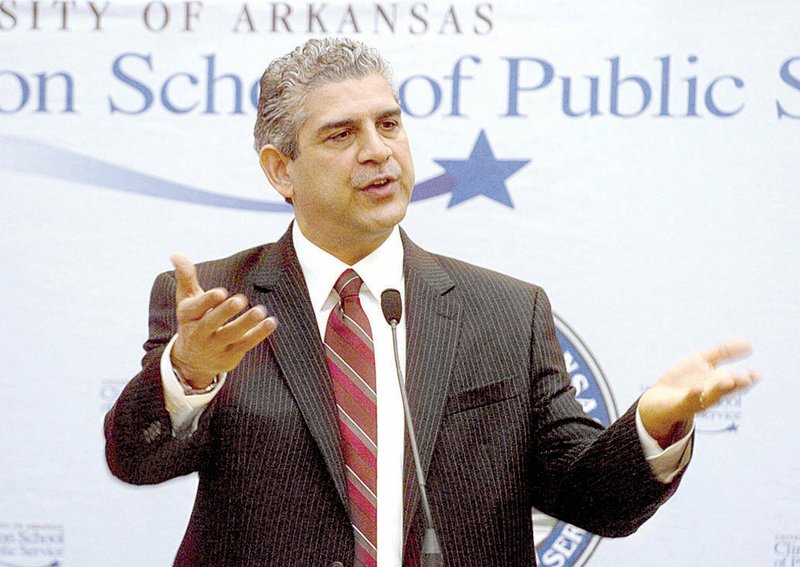LITTLE ROCK — The Palestine Liberation Organization’s representative to the United States said in Little Rock on Monday that Palestinians cannot restart peace negotiations with Israel until it halts building in occupied territories, including East Jerusalem.
Ambassador Maen Rashid Areikat, chief of the PLO Mission to the United States, said during a speech at the University of Arkansas Clinton School of Public Service that Israel agreed to halt settlement activities as part of the “road map” for peace promoted by former President George W. Bush.
Areikat portrayed the continued building, particularly in East Jerusalem, as a strategy backed by hard-line elements in Israeli Prime Minister Benjamin Netanyahu’s government to scuttle negotiations and incite armed conflict instead.
“It’s the position of the entire world that in order for Israel to show good faith, they have to freeze building settlements ... [it is] pushing the Palestinians once again to choose violence over peaceful tactics to end the conflict,” Areikat said to a standing room-only crowd.
“This is what Israel wants the Palestinians to resort to. They want the Palestinians to once again say that peaceful tactics, approaches, are not paying off, and that Israel only can understand the language of violence and armed struggle - something that our leadership does not agree with,” he said.
Netanyahu has said in the past that he would not slow construction of Jewish homes in East Jerusalem, which Israel annexed in 1967.
In a Monday interview with Israel Radio, Benny Begin, a member of Netanyahu’s inner cabinet, said the status of East Jerusalem should be resolved in direct negotiations with the Palestinians, not in advance, according to The New York Times.
Begin also said Monday that American pressure to curb building is not helping the peace process.
“It’s irritating and certainly a cause of concern,” he said, according to the Times. “This change will definitely bring about the opposite of the declared goal. It will bring about a hardening in the policy of the Arabs and of the Palestinian Authority.”
Areikat has been involved in negotiations with Israel for 17 years.
From 1993-98, he worked out of the Orient House, the PLO headquarters in Jerusalem.
After that, he spent 11 years working in the Negotiations Affairs Department of the PLO in Ramallah, most recently as its deputy head and coordinator-general.
In 2009, he became chief of the PLO Mission in the United States. The Mission promotes Palestinian interests in America through governmental, commercial and educational outreach.
Areikat said Monday that both Israelis and Palestinians are responsible for the lack of progress toward peace.
He said one of the major flaws in past frameworks for peace - such as the 1993 Oslo Accords - was that they were transitional and put off dealing with major issues such as the status of Israeli settlements, the fate of millions of Palestinian refugees and the future of Jerusalem.
“This proved to be wrong because events on the ground dictated the process rather than the good intentions of political leadership,” he said. “Extremists on both sides succeeded in derailing the process.”
He said any future peace deal must include the creation of a Palestinian state emptied of all Israeli colonies.
Areikat said Palestinian refugees must also be given the right to return to their former homes or compensation for losses associated with their displacement. And he said the new Palestinian state must include East Jerusalem as its capital.
“We very much seek peace in the Middle East,” Areikat said. “A peace that will be based on a two-state solution, Israel and Palestine, living side by side in peace and security.”
Raouf Halaby, a professor at Ouachita Baptist University in Arkadelphia, said after the speech that a two-state solution is the only way to sustainable peace.
Halaby is a Palestinian forced to leave his home in Jerusalem as a child in 1959.
Eventually, he came to the United States and became a U.S. citizen. The Christian has taught at Ouachita Baptist for the past 37 years.
Halaby said creating a Palestinian state is a matter of justice for Palestinians and a matter of national security for the United States.
“The real cancer in the Islamic world starts between the Palestinians and Israelis. That’s the epicenter of the conflict,” he said. “If you solve the conflict, it might not eradicate all our problems with the Muslim world, but it will go a long way toward ... taking the wind out of the sails of the anger that exists.”
A video of Areikat’s speech will be posted at www.clintonschoolspeakers.com.
Arkansas, Pages 7 on 03/30/2010
